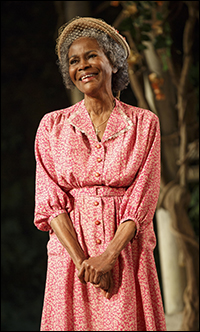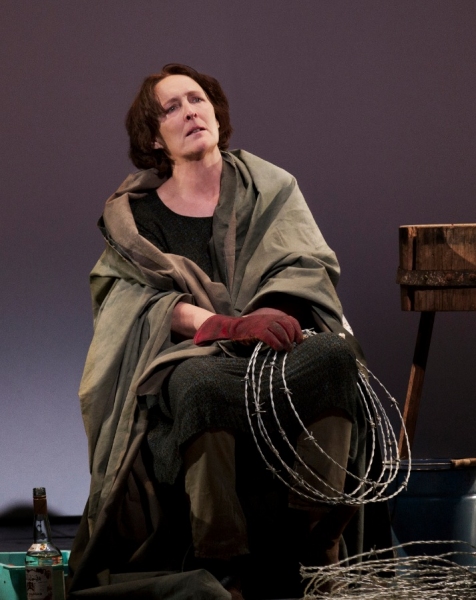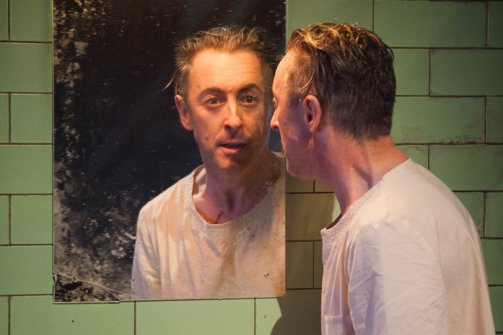In today’s Wall Street Journal I hail the opening of the Broadway revival of The Trip to Bountiful. Here’s an excerpt.
* * *
 Horton Foote’s “The Trip to Bountiful” is one of the half-dozen greatest American plays, yet its greatness has yet to be generally acknowledged. The reasons why aren’t hard to grasp. Like all of Mr. Foote’s plays, it’s a soft-spoken character study, the tale of a tired old woman from Texas who hasn’t seen her home town in 20 years, longs to do so once more before she dies and decides one day to go there. Nothing else happens, nor do the characters say anything especially memorable. They merely show you how ordinary people live their lives. The poetry–and “The Trip to Bountiful” is profoundly poetic–is between the lines. Yet no one with a receptive soul can fail to appreciate the play’s myriad beauties, and Michael Wilson’s new revival, in which Cicely Tyson returns to Broadway for the first time since 1983, is unforgettably excellent. I’ve never been more deeply moved by a theatrical production of any kind….
Horton Foote’s “The Trip to Bountiful” is one of the half-dozen greatest American plays, yet its greatness has yet to be generally acknowledged. The reasons why aren’t hard to grasp. Like all of Mr. Foote’s plays, it’s a soft-spoken character study, the tale of a tired old woman from Texas who hasn’t seen her home town in 20 years, longs to do so once more before she dies and decides one day to go there. Nothing else happens, nor do the characters say anything especially memorable. They merely show you how ordinary people live their lives. The poetry–and “The Trip to Bountiful” is profoundly poetic–is between the lines. Yet no one with a receptive soul can fail to appreciate the play’s myriad beauties, and Michael Wilson’s new revival, in which Cicely Tyson returns to Broadway for the first time since 1983, is unforgettably excellent. I’ve never been more deeply moved by a theatrical production of any kind….
Ms. Tyson is, of course, the star of the show, but she never indulges in the kind of notice-me exaggeration to which “stars” too often stoop. Indeed, what is most striking about her performance is its total lack of sentimentality. She speaks her lines in a cracked, vinegary old-lady voice in which no trace of self-pity can be heard, trusting to Mr. Foote to do the rest. If you’ve ever felt the fear of watching an increasingly frail parent try to keep on living her life the way she always has…well, you’ll feel it all over again as you watch Ms. Tyson on the stage of the Stephen Sondheim Theatre. That’s the measure of the truth of her acting.
Part of what makes this production so fine is the unanimity with which Ms. Tyson’s colleagues support her magnificent performance….
Most of the parts in this production of “The Trip to Bountiful,” which takes place in Texas circa 1953, are played by black actors. “Non-traditional” casting, as it’s known in the theater business, can be both gratuitous and distracting, but at its best it’s capable of shedding fresh light on a familiar play. It works wonderfully well here, in part because it’s never stressed….
* * *
Read the whole thing here.
Archives for April 2013
TT: Snapshot
Jack Paar interviews Mary McCarthy on The Jack Paar Show in 1963. The McCarthy segment starts nine minutes into the clip. Her segment is preceded by an interview with Milt Kamen:
(This is the latest in a series of arts-related videos that appear in this space each Monday and Wednesday.)
TT: Almanac
“In violence, we forget who we are.”
Mary McCarthy, “Characters in Fiction”
TT: At the atheists’ ball
Once again The Wall Street Journal has given me two extra slots this week to report on the many shows that are currently opening on Broadway. Today I report on The Testament of Mary and Alan Cumming’s Macbeth, neither of which did much for me. Here’s an excerpt.
* * *
 If you’re a lapsed Catholic, preferably Irish, who now believes that Christianity is the principal source of evil in the modern world, then I encourage you to see “The Testament of Mary,” a modern-dress solo stage version of the 2012 novella by Colm Tóibín in which Jesus’ mother (played by Fiona Shaw) proclaims to all and sundry that her son was (A) crazy and (B) not the Messiah. It’s your kind of play, and then some. If, on the other hand, you’re a Christian of the old-fashioned sort, you’ll likely go home praying for fire, or at least a plague of locusts, to descend upon the Walter Kerr Theatre and its blasphemous occupants.
If you’re a lapsed Catholic, preferably Irish, who now believes that Christianity is the principal source of evil in the modern world, then I encourage you to see “The Testament of Mary,” a modern-dress solo stage version of the 2012 novella by Colm Tóibín in which Jesus’ mother (played by Fiona Shaw) proclaims to all and sundry that her son was (A) crazy and (B) not the Messiah. It’s your kind of play, and then some. If, on the other hand, you’re a Christian of the old-fashioned sort, you’ll likely go home praying for fire, or at least a plague of locusts, to descend upon the Walter Kerr Theatre and its blasphemous occupants.
But what about everybody else? Assuming that you don’t have a horse in this particular race, how does “The Testament of Mary” come across when considered not as an anti-religious statement but as a piece of pure drama? Perhaps not surprisingly, it proves to be predictable in the extreme. The members of the audience, whose unswerving secularity is comfortably taken for granted by Mr. Tóibín and his collaborators, are invited to snigger along with Mary at her son and his disciples, and snigger they do, over and over again….
Ms. Shaw is, of course, a great actor–I have deeply etched memories of the avant-garde “Medea” that she brought to Broadway in 2002–but she mostly settles for generalized mannerism in “The Testament of Mary,” though her performance is both specific and memorable whenever she modulates out of the key of outrage and slips into something less obvious….
 Alan Cumming’s near-solo version of “Macbeth,” which is set in an insane asylum, bears a number of palpable similarities to “The Testament of Mary.” It, too, is a high-concept show about madness–Mr. Cumming plays a lunatic who seems to think that he’s all of the characters in the play–accompanied by unending horror-show electronic music. Like Ms. Shaw, he spends the evening thrashing around the stage in a state of anguish, and he, too, strips to the buff and takes a bath in full view of the audience.
Alan Cumming’s near-solo version of “Macbeth,” which is set in an insane asylum, bears a number of palpable similarities to “The Testament of Mary.” It, too, is a high-concept show about madness–Mr. Cumming plays a lunatic who seems to think that he’s all of the characters in the play–accompanied by unending horror-show electronic music. Like Ms. Shaw, he spends the evening thrashing around the stage in a state of anguish, and he, too, strips to the buff and takes a bath in full view of the audience.
While I yield to no one in my admiration for Mr. Cumming, his high, reedy voice is a less-than-ideal instrument for the speaking of Shakespearean verse, especially when you’re expected to listen to it for an hour and 40 minutes. Nor is his acting sufficiently varied in tone, involving though it is from moment to moment…
* * *
Read the whole thing here.
TT: Almanac
“Curiosity is one of the lowest of the human faculties.”
E.M. Forster, Aspects of the Novel
TT: Just because
Rudolf Serkin, Eugene Ormandy and the Philadelphia Orchestra perform the second movement of Mozart’s C Major Piano Concerto, K. 467:
(This is the latest in a series of arts-related videos that appear in this space each Monday and Wednesday.)
TT: Almanac
“I do think that if a book is really well written, it’s terribly difficult to see how it’s done. I think it’s part of the mystery of writing that the real great hands always conceal how they do it. And an awful lot of bad writing is due to people trying to write like great writers and not really seeing that the outer covering has nothing to do with it at all.”
Anthony Powell, interviewed by Michael Barber (Paris Review, Spring-Summer 1978)
TT: Plus ça change
For my thoughts on what’s happening in Boston, go here.
